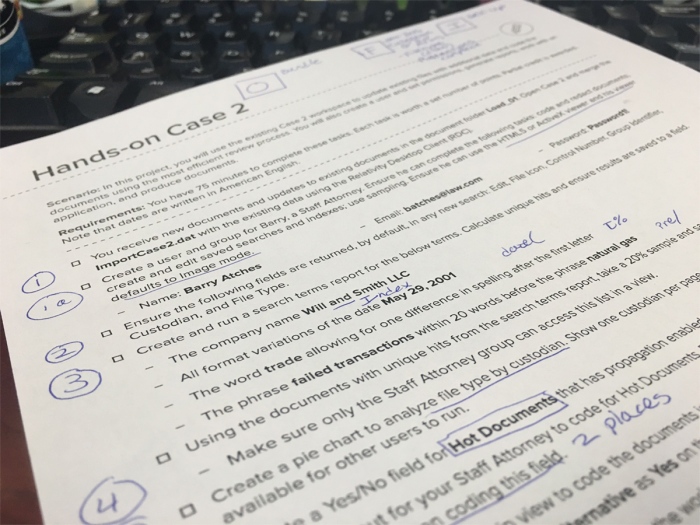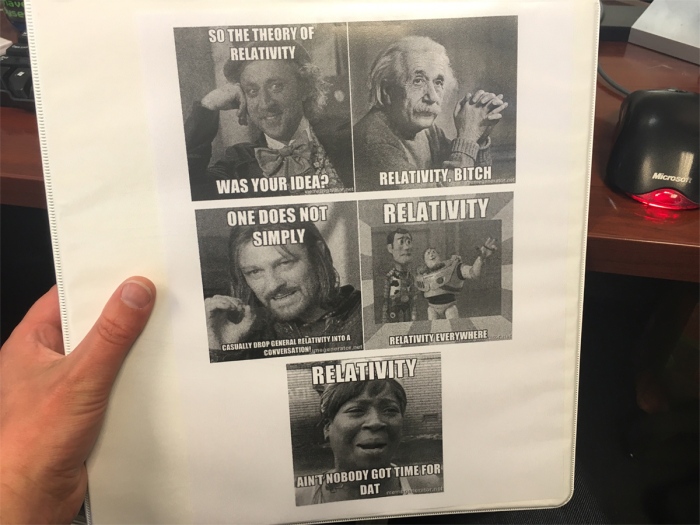
A week ago, I passed the RCA (Relativity Certified Administrator) Exam in San Francisco, hosted as part of the Relativity Roadshow. Not my first rodeo, I had previously failed the exam last May by a few lowly points.
I’m so happy, partially because I never have to go through that again.
I’m sharing my experience through both tests to hopefully help those who are about to take it as well.
As an intro, I am double-certified in Concordance, and also have certifications from IPRO and iConect. I’ve been in the industry for almost 15 years, I’ve used Relativity for awhile, and I never struggled with an exam before. Failing was an unexpected blow. So, if you’re about to take on this juggernaut of a test:
- Do not underestimate this exam
- Study hard and time yourself on the hands-on projects
- Be good to yourself no matter what the outcome is
The passing rate is roughly 40%. Word on the street is that the owner of kCura failed it the first time he took it.
Like I said, be good to yourself.
Studying for the Exam
The second time I took the exam, I set up a study schedule for myself–how many times I wanted to do each task, with checkboxes. The last two weeks before the exam, I assigned myself something to do each day on a calendar page.
I also made an old-school binder full of my study materials and calendar. It made me happy.

Hands-down, the Exam Workbook and Online Practice Quiz have the bulk of what I found valuable. Many of the quiz questions are worded very similarly to the Knowledge Check and Special Considerations questions. Also, the methods used in the workbook are very applicable to the Hands-On cases. Even if you’re a proficient administrator, I recommend going through the data so you understand kCura best practices (I do some things differently than their recommended methods, simply because of client needs and the way our templates are set up). I didn’t want to lose points.
I took the online quiz of sample questions until I was sick of getting 100%.
I also read the Admin Guide, dtSearch Guide, Quick Reference Guides and the other recommended materials, cover to cover, multiple times. The only thing I didn’t delve too deeply into were the Advice Recipes.
The Q&A webinars are invaluable. I recommend attending every single one between now and your test. The questions at the end are so worth listening to, because people think of approaches that you may not, or ask a question that will force you to think about a problem differently. I can’t say enough about how much I learned from these. Also, the hosts sometimes give very key advice from when they took the Exam—for example, opening an Incognito window in Chrome to test your user, so you can quickly go back and forth between adjusting permissions and checking the results. Huge time saver!
The first time I took the exam, we weren’t provided with sample data for studying in the Hands On projects. You lucky people have sample data. Use it.
I timed myself to get my Hands On completion time under 60 minutes for every case. This was integral in my passing, since last time, I ran out of time and couldn’t check anything I’d done (ouch). Each of the four scenarios started to feel like a friend, which is a relief when you’re given a random scenario, and you’re like, YEAH, I know you!
One of the most helpful exercises I did with the Hands On projects was to print out multiple copies of each case, and quickly parse them into which order I’d do them in, and organizing the steps so I could create all Objects, Fields, and Indexes at the same time whenever possible. I would often do this without doing the projects, just so I knew the cases inside and out, along with all the “sneaky” pieces I’d need to do or check. I always prioritized doing Objects, Fields and Indexes first, then moving on to the easiest tasks on the case, leaving anything that took more time for the last part. Finally, I used the last few minutes to check everything (everything!) I did—log in as my users, test searches, etc.
I didn’t make flashcards the second time I took the test. Instead, I printed out multiple copies of the Knowledge Checks and the key, working through them over and over. I also used a list from my first test of a braindump of questions I didn’t know the answers to, so I could look them up.
Taking the Exam
I showed up 30 minutes early to get my computer set up, breathe, run through a last checklist, and get in the right headspace. It was very helpful–we won’t talk about my heart rate that day. Crashing in through the door five minutes before the test really isn’t a great idea.
The Hands On section came first, with the quiz coming 10-15 minutes afterward. This break is a good time to breathe, drink some water, and use the bathroom (if even just to get up and stretch and get your body working again).
kCura “breaks” or doesn’t fully set up things in your database, so you have to really use a thoughtful, intuitive process as you go through. If it doesn’t look right, it probably isn’t. I work off of very carefully engineered templates at work, so the first time I took the test, I didn’t think to check whether certain really important fields (ahem) were set up as relational, and that cost me some serious time. They also say people often forget to run things, like Search Terms Reports and indexes, even though they set them up correctly. Having extra time to chase down a problem is vital, because you’re almost guaranteed to find one. Or just forget how to tie your shoelaces and screw up something basic, because you’re stressed out (this happened both times I took the test. So annoyed).
The online quiz allows you to flag things to go back to later, and you can blaze through the questions you find easy, leaving the harder ones for last. Both times I took the test, I had at least 20 minutes to spare. Eventually, staring at the questions just doesn’t help anymore, and you click Submit. No feedback is given at this time.
Last May, it took them roughly 3 hours to get my results to me. This May, it took over 26 hours. Major piece of advice? Find something REALLY distracting to do. My head wanted to analyze everything I’d done, especially in the Hands On project, and second-guess it until I almost convinced myself there was no way I’d passed. Wretched. Find an activity.
What It’s Really Like + Random Advice
This test is just hard–the sheer volume of information you need to memorize, the tactics needed to be fast enough to do everything you need to, and you know it’s going to be hard so you stress out. You’re smart, but you can’t rely on being smart–you have to be tactical.
If you can, tell as few people as possible that you’re taking the test that day. Otherwise, if you do fail, and you have to drag your deflated self back to the office where everyone knows you went for the RCA, you’ll be dealt the double-whammy of “WHUT? You’re really smart and stuff! How could you possibly fail?” which is awesome and sweet and darling, but makes you feel even more like you let the world down. If you pass, then AWESOME! Hey guys! I took this test and I passed!
How do you feel about your preparedness? Are your times good on your hands-on projects (all of them)? Have you read all the materials multiple times? Are you SICK of getting 100% on the online test questions? Don’t take this exam before you’re ready. If you aren’t, reschedule. Seriously. No harm, no foul, you win.
I highly recommend something I didn’t do, which is making sure that you have time for a re-take of the exam before it switches to another version. I studied for a version 8 exam, got the flu, and had to start over since the next test available was on 9. This last time, if I’d failed again, I would have had to start over with 9.3 since I was on the last test of 9.2. Failing is horrible, but having to learn all new Hands On projects and features adds an extra “f*&% you” to the adventure.
In Conclusion
Go get ’em, tiger. It feels AMAZING when you get that email saying that you passed!